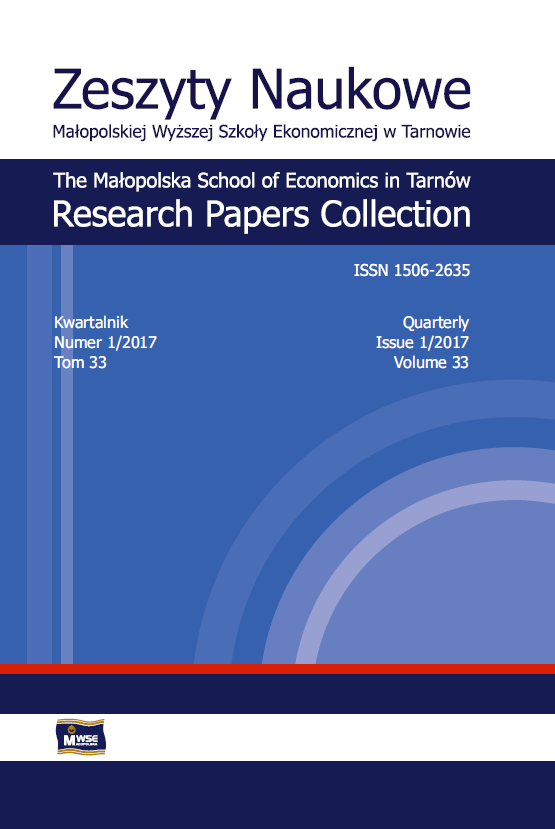Abstract
This paper is an attempt to assess the efficiency of tax administration in Poland in comparison with selected countries. In the economic terms, effectiveness in tax administration is measured by the expenditure on resources consumed on its functioning and fulfilling statutory functions. In this respect, the key indicator is the efficiency of collecting tax debts measured by the proportion of their value to the collection costs. The Polish tax system, reformed in the 1980s and 1990s can be regarded as modelled on the solutions used in the countries of Western Europe. In addition, a number of laws were implemented directly within the processes of harmonisation after Poland’s accession to the European Union. Therefore, analysing the qualitative and quantitative indicators and comparing them to the results achieved in Western European countries allowed the authors to evaluate the functioning of the tax collection administration in Poland. As the analysis shows, the Polish tax system still differs from the average of the other countries of the European economies and the rest of the world. Among the biggest problems, the authors mentioned high costs of the operations of the tax administration (both in nominal terms and relative to GDP or to the number of people employed), a lot of nuisance related to entrepreneurs’ responsibility for settling tax liabilities and the low quality of tax decisions imposed on tax payers measured by the number of their repeals in the context of trials in administrative courts. The proposals have been developed through the study of literature, with current data provided by Eurostat, OECD and the data published by the Polish Ministry of Finance.
References
Devereux, M.P. (red.). (2007). Efektywność polityki podatkowej. Warszawa: Wydawnictwo Sejmowe. ISBN 9788370598051.
View in Google Scholar
MF. (2016). Sprawozdanie roczne. Kontrola skarbowa w 2015 r. [online, dostęp: 2016-12-11]. Warszawa: Ministerstwo Finansów. Departament Kontroli Skarbowej. Dostępny w Internecie: http://www.mf.gov.pl/documents/764034/1424099/Sprawozdanie+roczne+z+dzia%C5%82a%C5%84+kontroli+skarbowej+za+2015r..pdf.
View in Google Scholar
Molik, P. (2012). Sądy uchylają interpretacje podatkowe Ministra Finansów. Dziennik Gazeta Prawna, 4.06.
View in Google Scholar
NIK. (2015). Wykonywanie wyroków wojewódzkich sądów administracyjnych i Naczelnego Sądu Administracyjnego przez urzędy skarbowe i izby celne: informacja o wynikach kontroli [online, dostęp: 2016-12-11]. Warszawa: Najwyższa Izba Kontroli. Departament Budżetu i Finansów. Dostępny w Internecie: https://www.nik.gov.pl/plik/id,8567,vp,10671.pdf.
View in Google Scholar
Nowak, A. (2007). Współczesne zasady podatkowe. W: B. Fiedor, J. Rymarczyk (red.). Ekonomia i międzynarodowe stosunki gospodarcze. Prace Naukowe Akademii Ekonomicznej im. Oskara Langego we Wrocławiu. T. 14. Wrocław: Wydawnictwo Akademii Ekonomicznej im. Oskara Langego. ISSN 0324-8445.
View in Google Scholar
OECD. (2015). Tax Administration 2015: Comparative Information on OECD and Other Advanced and Emerging Economies. Paris: OECD Publishing. DOI: http://dx.doi.org/10.1787/tax_admin-2015-en.
View in Google Scholar
PwC. (2015). Paying Taxes 2015: The Global Picture [online, dostęp: 2016-12-11]. PwC; World Bank. Dostępny w Internecie: https://www.pwc.com/gx/en/paying-taxes/pdf/pwc-paying-taxes-2015-low-resolution.pdf.
View in Google Scholar
PwC. (2016). Paying Taxes 2016 [online, dostęp: 2016-12-11]. 10th ed. PwC; World Bank. Dostępny w Internecie: https://www.pwc.com/gx/en/paying-taxes-2016/paying-taxes-2016.pdf.
View in Google Scholar
Stiglitz, J.E. (2012). Ekonomia sektora publicznego. Warszawa: Wydawnictwo Naukowe PWN. ISBN 9788301151874.
View in Google Scholar
Wach, K. (2005). Systemy podatkowe Unii Europejskiej. Kraków: Oficyna Ekonomiczna. ISBN 8389355809.
View in Google Scholar
Walkowiak, R. (2011). Prakseologiczne zasady sprawnego działania. Zeszyty Naukowe Ekonomia i Zarządzanie, 1, 29.
View in Google Scholar
Wyrzykowski, W. (2004). Polski system podatków i opłat w zarysie. Gdańsk: Scientific Publishing Group. ISBN 8392107527.
View in Google Scholar
© Copyright by Małopolska School of Economics in Tarnów. The articles are available under the Creative Commons Attribution NonCommercial-NoDerivatives 4.0 International License


